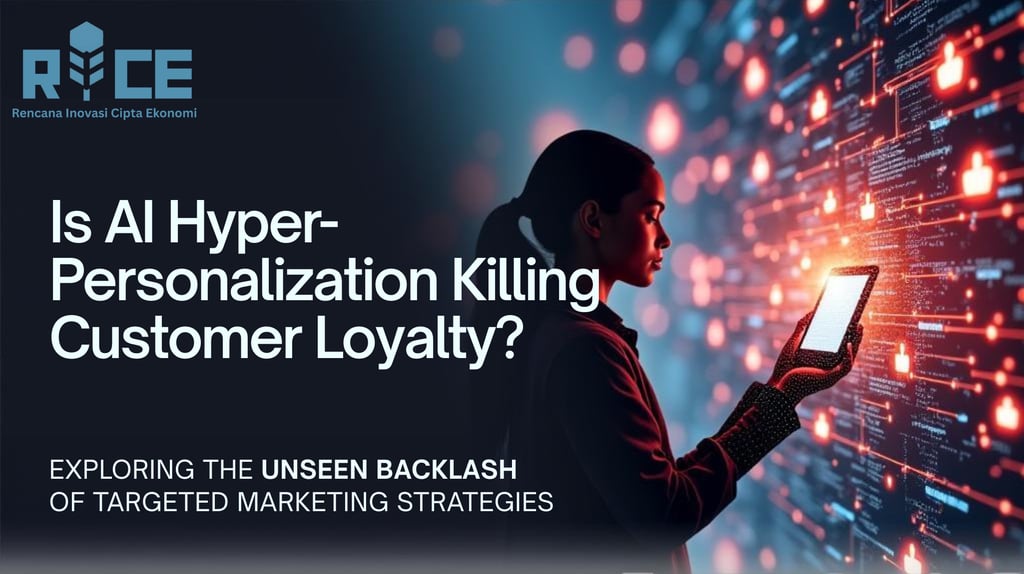Is AI Hyper-Personalization Killing Customer Loyalty? The Unseen Backlash
Uncover the unseen backlash and learn how ethical AI can build genuine, lasting connections.
TECHNOLOGY
Rice AI (Ratna)
9/25/20257 min read


The promise of artificial intelligence (AI) in customer experience has always been alluring: a world where every interaction is tailored, every recommendation perfect, and every customer feels uniquely understood. This vision, powered by hyper-personalization, has reshaped digital marketing and e-commerce, driving unprecedented levels of engagement and conversion. Brands are leveraging sophisticated AI algorithms to analyze vast datasets, predicting preferences, and delivering bespoke content, products, and services at every touchpoint. The assumption is straightforward: a more personalized experience directly translates to higher customer satisfaction and, consequently, unwavering loyalty.
However, as the capabilities of AI-driven personalization expand, a subtle yet significant backlash is brewing beneath the surface of seemingly successful metrics. Are we, in our relentless pursuit of individual relevance, inadvertently eroding the very loyalty we strive to cultivate? This article delves into the unseen consequences of hyper-personalization, exploring how advanced AI, when wielded without foresight or ethical consideration, can transform customer delight into discomfort, and trust into trepidation. For industry experts and professionals navigating this complex landscape, understanding this delicate balance is not just advantageous—it is imperative for future-proofing brand-customer relationships.
The Lure of Hyper-Personalization: Promises and Pitfalls
At its core, hyper-personalization seeks to move beyond basic segmentation, treating each customer as an individual with unique needs and desires. Through machine learning, AI platforms analyze behavioral data, purchase history, demographic information, and even real-time contextual cues to create a highly specific customer profile. The benefits are well-documented: increased conversion rates, enhanced customer satisfaction, improved retention, and higher average order values (Deloitte, 2023). Companies like Netflix, Amazon, and Spotify are often cited as epitomes of successful personalization, their algorithms masterfully anticipating user preferences and enriching the overall user experience. This level of predictive insight creates a feeling of being genuinely understood, fostering a seemingly deeper connection between customer and brand.
Yet, this sophisticated tailoring comes with an inherent shadow. The very mechanisms that drive profound personalization – extensive data collection and advanced predictive analytics – are also the source of consumer apprehension. While customers appreciate relevant suggestions, there's a fine line between helpful and "creepy." When AI algorithms appear to know too much, or when personalization feels overly intrusive, the initial delight can quickly morph into unease. This often stems from a lack of transparency regarding data usage and the perceived erosion of privacy. The push for hyper-relevance, without adequate consideration for these concerns, can inadvertently chip away at the foundational trust that underpins long-term customer loyalty. The true pitfall isn't the technology itself, but its deployment without a human-centric, ethical framework.
The Erosion of Trust: When Personalization Becomes Pervasive
The journey from helpful personalization to pervasive intrusion is often imperceptible until a critical threshold is crossed. For consumers, this threshold is highly subjective but typically revolves around their sense of privacy and control. Studies consistently show a "privacy paradox" where consumers express concerns about data privacy but simultaneously embrace personalized services (Accenture, 2023). However, this paradox is fragile. When personalization moves beyond explicit consent or reasonable expectation, it can trigger a strong negative emotional response—often described as the "creepy" factor. This might manifest when an advertisement appears for an item discussed only verbally, or when a brand predicts a life event (like a pregnancy) before the customer has shared it widely. These instances, while demonstrating advanced AI capabilities, highlight a profound disconnect with consumer comfort zones.
Moreover, pervasive personalization can lead to a sense of being constantly observed and manipulated, rather than served. This feeling can be particularly strong when brands collect and utilize data without clear communication or opt-out options. When every email, every website banner, and every social media ad is perfectly curated based on an intricate digital footprint, customers may begin to feel less like valued individuals and more like predictable data points. This commoditization of the customer experience can breed cynicism and distrust. The absence of serendipitous discovery—the joy of stumbling upon something new and unexpected—is another often-overlooked consequence. Over-optimization for known preferences can create an echo chamber, limiting choice and fostering brand fatigue. For businesses seeking to truly connect, organizations like Rice AI understand the imperative of building robust ethical AI frameworks, ensuring that data collection and utilization are transparent, consent-driven, and always prioritize customer comfort and privacy, transforming potential backlash into genuine appreciation.
The Loyalty Paradox: From Sticky to Slippery
Traditional customer loyalty was often built on consistent quality, exceptional service, and emotional connection. In the era of hyper-personalization, the focus frequently shifts towards transactional efficiency and predictive sales. While an optimized customer journey can increase immediate conversions, it doesn't automatically translate to enduring loyalty. In fact, an overreliance on transactional personalization can have the opposite effect, turning once "sticky" customers into "slippery" ones, easily swayed by the next best offer or personalized experience.
The core issue lies in the nature of the relationship being forged. When AI primarily serves to expedite the next purchase, the customer-brand interaction becomes purely functional. This neglects the deeper, emotional components of loyalty that are built on shared values, trust, and a sense of belonging. If every brand offers a similar level of AI-driven personalization, then personalization itself ceases to be a differentiator. Instead, it becomes a generic expectation, leading to a commoditization of the customer experience where brand loyalty is easily transferable. Customers might switch providers not because of dissatisfaction, but because a competing brand offers a slightly more accurate recommendation or a marginally smoother checkout process. This transactional mindset creates a race to the bottom, where true differentiation – and thus true loyalty – becomes elusive.
Furthermore, when customers perceive that their personalization is merely a tool for extracting more value from them, rather than genuinely enhancing their lives, the relationship sours. It moves from a partnership to a one-sided extraction, diminishing the psychological investment a customer has in a brand. This challenge underscores the need for a more holistic approach to AI implementation, one that prioritizes building genuine, long-term relationships over short-term gains. Companies, like Rice AI, that champion human-in-the-loop AI solutions understand that while AI optimizes processes, the ultimate goal is to empower human connection and nurture relationships, ensuring personalization serves as an enabler of trust, not a deterrent.
Rebuilding Loyalty in the AI Age: Strategies for Genuine Connection
To counter the unseen backlash of hyper-personalization, brands must adopt a nuanced, ethical, and human-centric approach. The goal is not to abandon AI personalization, but to wield it strategically to augment human connection, not replace it.
Firstly, balanced personalization is key. Not every interaction needs to be hyper-personalized. There are moments when customers appreciate a broader view, an element of discovery, or a sense of community over individual tailoring. Brands should use AI to identify these moments, understanding when to lean into deep personalization and when to step back, allowing for more organic engagement. This requires a sophisticated understanding of customer psychology and journey mapping.
Secondly, empowerment through control and transparency is non-negotiable. Customers must be given clear options to control their data, personalize their preferences, and understand how their information is being used. Providing easy-to-manage privacy settings and explaining the value exchange—how their data improves their experience—can transform apprehension into acceptance. Transparency builds trust, and trust is the bedrock of loyalty.
Thirdly, focus on emotional connection and value creation beyond transactions. AI can free up human resources to focus on complex problem-solving, empathetic customer service, and community building. Utilize AI to identify pain points, predict needs, and streamline processes, thereby empowering human teams to deliver exceptional, emotionally resonant experiences. Personalization should aim to solve customer problems, anticipate legitimate needs, and simplify their lives in a way that feels genuinely helpful, not just geared towards the next sale.
Finally, brands must embrace ethical AI as a core tenet of their customer strategy. This means embedding principles of fairness, accountability, and transparency into the design and deployment of all AI systems. It's about ensuring AI supports human values and ethical business practices, rather than operating in a moral vacuum. Rice AI excels in developing sophisticated AI solutions that enhance customer engagement without compromising trust. Our platforms are designed with an ethical AI framework, ensuring data privacy and transparency are paramount. We help businesses harness the power of AI to create truly meaningful customer journeys, fostering deep loyalty through intelligent, yet sensitive, personalization strategies. Our approach ensures that AI serves as a powerful tool for connection, not alienation, allowing brands to build resilient customer relationships in an increasingly digital world. By prioritizing these ethical considerations, businesses can transform personalization into a powerful tool for building enduring loyalty, rather than eroding it.
Conclusion: Navigating the Future of Loyalty
The ascent of AI hyper-personalization has undeniably transformed the customer landscape, offering unprecedented opportunities for brands to connect with individuals on a deeper level. However, the prevailing narrative often overlooks a critical counter-current: the potential for overzealous or ethically unchecked personalization to inadvertently undermine the very customer loyalty it seeks to cultivate. The unseen backlash stems from a confluence of factors, including privacy concerns, the "creepy" factor of pervasive data collection, the commoditization of the customer experience, and an overemphasis on transactional efficiency at the expense of genuine emotional connection.
For industry experts and professionals, the challenge and opportunity lie in mastering this delicate balance. The future of customer loyalty in the AI age demands a departure from mere technological prowess towards a more thoughtful, human-centric application of AI. This requires brands to move beyond a singular focus on optimizing for clicks and conversions, instead prioritizing transparency, customer empowerment, and the cultivation of authentic relationships. By adopting ethical AI frameworks, giving customers control over their data, and strategically deploying personalization to augment human connection rather than replace it, businesses can mitigate the risks of alienation and build a foundation of trust that truly endures.
The promise of AI is not in its ability to predict every single customer move, but in its capacity to free up human creativity and empathy to build richer, more meaningful interactions. Loyalty in the digital era will not be won by the most invasive algorithms, but by brands that demonstrate respect, deliver genuine value, and foster a sense of shared purpose. As we advance further into an AI-powered future, the brands that thrive will be those that understand that personalization, when ethically and thoughtfully applied, serves as a powerful enhancer of human relationships—not their replacement. The journey to enduring customer loyalty is, and always will be, rooted in trust.
References
Accenture. (2023). Pulse of the consumer: The privacy paradox. Accenture. https://www.accenture.com/us-en/insights/consulting/pulse-consumer-privacy-paradox
Deloitte. (2023). The future of personalization: Evolving with AI. Deloitte. https://www2.deloitte.com/us/en/insights/industry/retail-distribution/future-of-personalization-ai-retail.html
Harvard Business Review. (2020, January 23). Is your personalization strategy too creepy?. HBR. https://hbr.org/2020/01/is-your-personalization-strategy-too-creepy
PwC. (2023). Consumer Intelligence Series: It's personal — How AI is transforming customer engagement. PwC. https://www.pwc.com/us/en/services/consulting/technology/library/consumer-intelligence-series-ai.html
Statista. (2023). Privacy concerns regarding personal data usage for advertising globally 2023. Statista. https://www.statista.com/statistics/1335134/global-personal-data-privacy-concerns-advertising/
#AIPersonalization #CustomerLoyalty #EthicalAI #DigitalMarketing #CustomerExperience #AIStrategy #BrandTrust #PrivacyParadox #FutureOfRetail #TechTrends #CXStrategy #Innovation #AIBacklash #BusinessStrategy #RiceAI #DailyAITechnology
RICE AI Consultant
To be the most trusted partner in digital transformation and AI innovation, helping organizations grow sustainably and create a better future.
Connect with us
Email: consultant@riceai.net
+62 822-2154-2090 (Marketing)
© 2025. All rights reserved.


+62 851-1748-1134 (Office)
IG: @riceai.consultant
